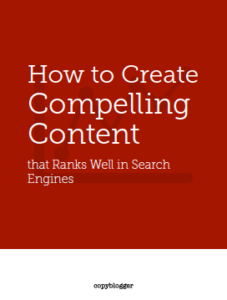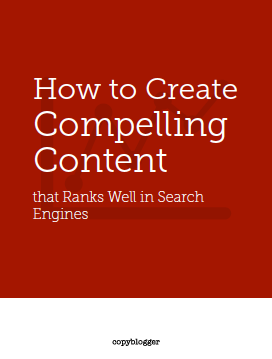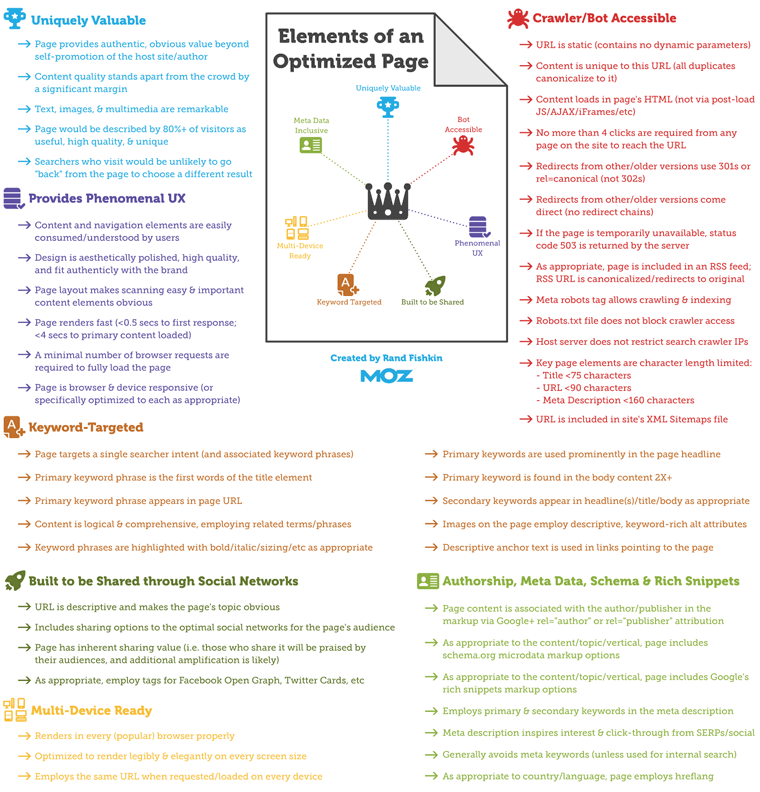I reject the term “SEO copywriter.” I couldn’t even get myself to use it in this post’s headline (even though it’s what I want to talk to you about).
The reason for my disdain of the term is it puts SEO before copywriting. If you believe this is a smart approach to creating effective content, this article will be a waste of your time.
Your copywriter needs to understand SEO.
Every online marketing writer should have a seriously solid grasp of SEO. If they don’t apply basic “white hat” (ethical and genuine) SEO practices when writing for your website and blog, you’ll realize less success with search and therefore get fewer eyeballs on your content. You don’t want that.
However, you also don’t want SEO to seize control of the work. In my opinion, writers who call themselves an “SEO copywriter” either (a) want to rank for the term, or (b) believe rankings equates to results. They don’t.
In advertising circles we’re fond of saying “Nothing kills a crappy product faster than great advertising.” It’s repeated often because it’s true. And the idea applies to SEO copywriting.
- Play only by the rules of the robot and you increase your search engine rankings.
- You increase your chances of getting clicks to take people to your website.
- You also increase your bounce rate while decreasing engagement, time on site, opt-ins, subscribers, shares, trials, buys and referrals.
Why would I be so bold as to state #3 above? Because the SEO-first mindset usually results in word puke.
The real objective isn’t to rank high or generate traffic. If you’re thinking in terms of long-term success, the real goal is accomplish these things, and then, give your visitor the best possible experience. They’ll spend more time on your site, share your content, and come again. And yes, search engines factor these things in big time.
A great copywriter is your gold mine.
In his fabulously helpful eBook, “How to Create Compelling Content that Ranks Well with Search Engines,” Copyblogger founder Brian Clark makes a very strong case that what appeals to readers and search engine spiders have become one and the same. Given the severe updates Google has made to its algorithm in recent years, it’d be impossible to disagree.
Therefore, Brian—who is unquestionably an authority on the subject—might take issue with my stance that “SEO copywriter” is a dangerous phrase. In fact, Copyblogger, among other things, specializes in teaching it. Still, Brian chose his words carefully when he titled the eBook and emphasized content, compelling content, for good reason.
 Get yourself a copy of the eBook. Read it. Save it. Refer to it often. It’s golden. Much of the points I’m going to make in the rest of this article come from the Copyblogger document.
Get yourself a copy of the eBook. Read it. Save it. Refer to it often. It’s golden. Much of the points I’m going to make in the rest of this article come from the Copyblogger document.
Or maybe you don’t want to dig into SEO. It’s not exactly sexy. Your solution then? Get a copywriter that gets it. Have him or her write your website and landing pages. Then, keep that copywriter around for the many website updates you’ll make and the content you need to produce.
At a search conference I attended earlier this year, one of the speakers said, “A great copywriter is your gold mine.”
SEO tactics that work.
Your SEO champion may be an in-house writer, agency scribe, freelancer, or even you. Regardless of WHO does the writing, these are the tactics that will amount to success.
Great online writers tune into the audience’s needs. They optimize the pages they write, but more importantly, write copy that builds trust to convert prospects to buyers.
Mastering keyword research is key. Brian Clark writes, “Google won’t treat you as relevant until others do.” Perfect. Enter keywords (and experts at selecting and using them). Master online writers will use keywords research tools, choose highly specific keyword phrases (often dubbed “long tail keywords”), and create powerful content resources, which inspire action.
Title tags and headlines are all-important. Your content must inform the search engines exactly what will be covered. Skilled writers know how to do this with cryptic title tags as well as the page’s headline. In most cases, by default, the headline is at least one of the lines that will appear when your content is shared via social networks. It must compel the prospects you target to click.
Meta descriptions are more important than you think. It’s often thought search engines don’t do anything with your meta description. Wrong. While it’s true they don’t crawl or index these brief snippets (up to 165 characters), they display them on the search engine results page just below the title. That’s huge because the copy there works to get the reader to click (that is, when it works). Meta descriptions should be carefully crafted to incite interest.
Link building is authority building. There’s no denying the importance of building authority. It’s central to content marketing, and now, the criteria that matters most to the search engines. Your ace copywriter must fully understand how to effectively execute internal links to other resources on your site and link out to useful and relevant resources on other websites and blogs.
Guest writing delivers big benefits. Contributing to established and high traffic blogs is a link building strategy that should never be underestimated. If you’ve seen the guest posts page on this website, you understand just how seriously I take guest writing. It’s my number one source of traffic and new business. You need to do it too. Sorry, you won’t accomplish this with your run-of-the-mill lowball content writer. Think big and work with the most savvy copywriters, bloggers and journalists you can find.
Research. Optimize. Connect.
Thanks again to Brian Clark for this trifecta of verbs that perfectly summarize the process required to create compelling content, rank well, and engage readers. And though Brian’s bound to rip into my tirade on the term “SEO copywriter,” perhaps he’ll appreciate me taking so much of his advice and sharing it.
Note: I do occasionally contribute posts to Copyblogger. I’m also a big fan of the site and its infinitely valuable free content.
That said, here’s Brian Clark on the kind of SEO that actually works from a long-term perspective.
- Creating high-value content that achieves business objectives as if search engines didn’t exist.
- Using the power of social media to gain exposure for that content, which results in natural links and other signals of quality and relevance.
- Focusing on enhancing the natural authority of websites, pages, and individual writers, which creates industry influence and trust with Google.
- Doing smart on-page optimization using the language the audience uses when searching and socializing, so Google sees you as the most relevant option.
Couldn’t have said it better myself.
Two more things…
 Download “The Plan to Grow Your Business with Effective Online Marketing”m for much more advice on the many components of content marketing.
Download “The Plan to Grow Your Business with Effective Online Marketing”m for much more advice on the many components of content marketing.
Dive into Moz.com and their infographic below if you want to continue unraveling the secrets to success with search.





![How to Write Powerful Headlines for Your Online Content [Infographic] How to Write Powerful Headlines for Your Online Content [Infographic]](https://feldmancreative.com/wp-content/uploads/2019/04/Screen-Shot-2019-04-19-at-5.38.54-PM.png)


Comments
Kim Duplechien
Another excellent piece and killer infograph! Thanks for all you contribute Barry.
Barry Feldman
Much appreciated Kim.
Copywriting Tips for a More Effective Home Page | Feldman Creative
[…] Fire Your SEO Writer […]